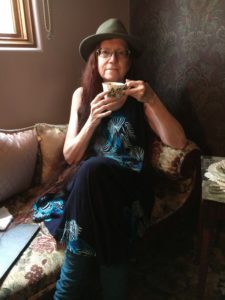 Here is the only thing I know to be true about writing advice: none of it is 100% true. There are always exceptions, always idiosyncrasies of individual process.
Here is the only thing I know to be true about writing advice: none of it is 100% true. There are always exceptions, always idiosyncrasies of individual process.
Here is the smartest piece of writing advice I ever got: said by Syne Mitchell while I was at Clarion West in 2005, “Try different things, find what works for you, and do that. Lots.”
Writers should pay attention to our own process. Sometimes we’re reluctant to do so. We worry that like the centipede in the story who stops being able to walk after thinking about exactly how she does it, looking at our own process will damage or kill it. A Schrödinger’s cat: we know we’re doing something, but if we look to prove that, it’ll vanish.
This is not actually true. Looking will, most probably, not kill it. If you are the rare exception that cannot look at their process without damaging it, a brief examination will let you know this without damaging anything too much. Maybe. There are no guarantees in writing advice.
But if you are part of the vast majority that WILL learn from it, what will you gain?
- A knowledge of WHEN you’re productive that will help you make the most of that time. Is the morning your most productive time? Then schedule your writing for those hours rather than the draggy and low word count afternoon.
- A knowledge of WHAT conditions make you productive. Does the coffee shop’s bustle and a few doses of caffeine stimulate you into productivity? Or do you need solitude and the ability to read aloud as you go? Find it out and do it, do it, do it.
- Permission to indulge yourself. Do new notebooks spur you to new stories? Then go for it. Does a two hour walk shake loose the clarifications you need for that revision? Then put on your sneakers.
- A sense of yourself as an artist. Because you are, you know. Your mind is a precious machine capable of creating wonderful things. Coddle and care for it. Appreciate the amazing combinations it makes, the verbal webs it spins, the hard glitter of its jewels.
Take a few weeks. Track your daily word count as well as the circumstances that accompany it, such as when and where you wrote. But go further than that. Track the other things that affect it: your mood, your diet, your sleep. You may find that daily walk doubles your output, that the days when you took time to eat breakfast rather than just slug down a latte, change your outlook.
FOr many of us, stress is a killer of productivity. I know nothing can drive me faster to the distraction of Bejeweled Blitz or cruising my Twitter stream. All the more reason to de-stress your life whenever you can, all in the name of writing.
Enjoy this writing advice and want more content like it? Check out the classes Cat gives via the Rambo Academy for Wayward Writers, which offers both on-demand and live online writing classes for fantasy and science fiction writers from Cat and other authors, including Ann Leckie, Seanan McGuire, Fran Wilde and other talents! All classes include three free slots.
Prefer to opt for weekly interaction, advice, opportunities to ask questions, and access to the Chez Rambo Discord community and critique group? Check out Cat’s Patreon. Or sample her writing here.







4 Responses
I am going to buy a new pair of boots. In the name of writing. 😉
Seriously, though, this is great advice. I keep meaning to start tracking my output. I even did, for a while, and now have this lonely Excel spreadsheet cluttering my computer, detailing a three week stint of writing mindfulness.
I need to figure out a good way to destress. For my writing’s sake, as well as my husband’s.
Tracking it can make you feel a lot happier. I sometimes forget how much stuff I’ve actually gotten done in the course of a week.
And destressing – YES. For me, it’s long, long walks.